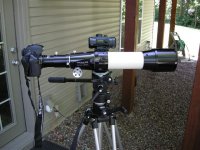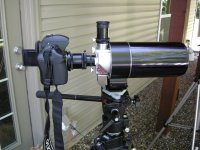Paul Hackett
Well-known member
Bill/ Paul
I gave an opinion on paul's comments, paul's point on cost and quality of astroscopes has been noted, we beg to differ on this subject, its not who is better, its another informed choice
Not all my points were answered, people will make their own minds up, if you are swayed by the astroscope, fine, but for the record there are far more people using scopes than astroscopes for digiscoping IMHO.
Its your personal chice at the end of the day Bill, i was offering another opinion, if its down to cost, then the skywatcher is for you
Paul
I gave an opinion on paul's comments, paul's point on cost and quality of astroscopes has been noted, we beg to differ on this subject, its not who is better, its another informed choice
Not all my points were answered, people will make their own minds up, if you are swayed by the astroscope, fine, but for the record there are far more people using scopes than astroscopes for digiscoping IMHO.
Its your personal chice at the end of the day Bill, i was offering another opinion, if its down to cost, then the skywatcher is for you
Paul






